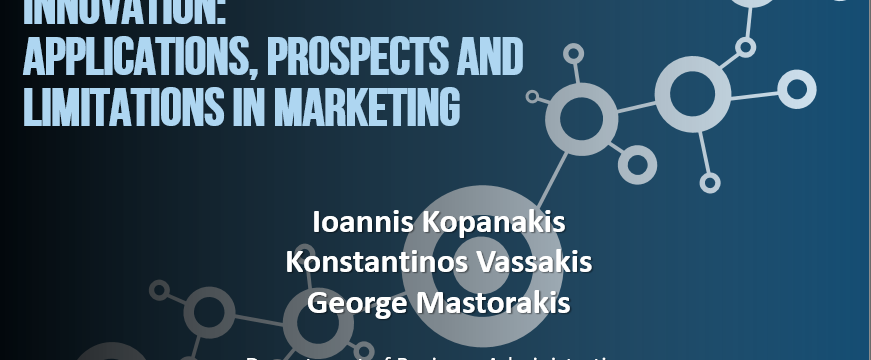Συνέδρια
Nothing Found
Sorry, no posts matched your criteria
Εκδηλώσεις
Euromed 2016: “SMEs in data-driven era: the role of data to firm performance”
/in Frontpage Article, Νέα, Ομιλίες /by e-biMέλη του Εργαστηρίου e-Bi Lab συμμετείχαν στην συγγραφή της ερευνητικής εργασίας “SMEs in data-driven era: the role of data to firm performance”, η οποία παρουσιάστηκε στο 9ο Διεθνές Συνέδριο EUROMED ACADEMY OF BUSINESS (ΕΜΑΒ) CONFERENCE με θέμα “Innovation, Entrepreneurship and Digital Ecosystems”, το οποίο πραγματοποιήθηκε στο Digital Economy Lab (DELab) του University of Warsaw στην Πολωνία στις 14-16 Σεπτεμβρίου 2016.
Nowadays, small and medium enterprises (SMEs) face an extremely competitive, globalized, technological changing and “knowledge-based” environment. Knowledge management and exploitation play a crucial role to innovation and competitiveness of enterprises. Digital technology has transformed the rules of innovation and performance in enterprises, since 90% of the worldwide data today was generated in just the last 2 years and that datafication is growing rapidly, while connected devices and sensors through “Internet of Things” are increasing (50 billion smart connected devices globally by 2020). As digital data are everywhere, in every sector and economy, big data is described as an asset for enterprises’ innovation, providing knowledge about processes, customers, human capital and technology necessary for enterprise.
Big data is a major resource for enterprises valuable knowledge to enterprises added value contribute to increased competitiveness and innovation. The leverage of big data provide enterprises not only in ICT sector, valuable knowledge leading on competitive advantage against rivals in terms of productivity, resources allocation and efficient marketing. In addition, data-driven innovation provides the ability to improve or foster new products/services, processes, organizational methods and markets.
There is evidence about positive impact of data-driven approach to firm performance, however it is limited to large enterprises. The purpose of this study is to present evidence about the impact of big data in SMEs’ performance and data-driven approach in innovative activity (data-driven innovation) of Greek SMEs, taking in account the economic turbulence of the recent years.
Keywords: data, SMEs, performance, knowledge, competitiveness
Συγγραφείς: Ιωάννης Κοπανάκης, Κωνσταντίνος Βασσάκης και Γεώργιος Μαστοράκης
Ioannis Kopanakis, Konstantinos Vassakis & George Mastorakis. “SMEs in data-driven era: the role of data to firm performance”. Presentation at 9th Annual EUROMED ACADEMY OF BUSINESS (ΕΜΑΒ) CONFERENCE “Innovation, Entrepreneurship and Digital Ecosystems”, 14-16 September 2016, Warsaw, Poland
MIBES 2016: “Big Data in Data-driven innovation: the impact in enterprises’ performance”
/in Frontpage Article, Νέα, Ομιλίες /by e-biMέλη του Εργαστηρίου e-Bi Lab συμμετείχαν στην συγγραφή της ερευνητικής εργασίας “Big Data in Data-driven innovation, the impact in enterprises’ performance”, η οποία παρουσιάστηκε στο 11o Διεθνές Συνέδριο Management of Innovative Business, Education & Support systems – MIBES 2016, το οποίο πραγματοποιήθηκε στο Ηράκλειο Κρήτης στις 22-24 Ιουνίου 2016 .
In the “knowledge-based economy”, enterprises have to be innovative in order to build and sustain a competitive advantage against rivals. However, innovation is complex due to fast changing technology, globalization (extremely competitive market conditions) and changing customers’ needs. Therefore, innovation is dependent on the combination of technologies and exploitation of knowledge.
The capacity of enterprises to access information and create valuable knowledge provides competitive advantage in the innovation race against rivals. In this context, “Data-Driven Innovation” (DDI) related to techniques and technologies for processing and analysing “big data”, is the method to innovate using data-based decision process.
The scope of this study is to present evidence about the significance of big data in data-driven innovation orientation of businesses and their performance.
Keywords: big data, data-driven, innovation, competitiveness.
Συγγραφείς: Ιωάννης Κοπανάκης, Κωνσταντίνος Βασσάκης και Γεώργιος Μαστοράκης
ICCMI 2016: “Big Data in Data-driven innovation: Applications, Prospects and Limitations in Marketing”
/in Frontpage Article, Νέα, Ομιλίες /by e-biMέλη του Εργαστηρίου e-Bi Lab συμμετείχαν στην συγγραφή της ερευνητικής εργασίας “Big Data in Data-driven innovation: Applications, Prospects and Limitations in Marketing”, η οποία παρουσιάστηκε στο 4th International Conference on Contemporary Marketing Issues -ICCMI 2016, το οποίο πραγματοποιήθηκε στο Ηράκλειο Κρήτης στις 22-24 Ιουνίου 2016 .
The real power of enterprises is related to their innovativeness, translated to their capacity accessing data and creating valuable knowledge. ―Data-Driven Innovation‖ (DDI), techniques and technologies for processing and analysing ―big data‖, is defined as the method to innovate using data-based decision process. Big data characterized by 3Vs: volume, variety and velocity seems to be a major resource for enterprises in the competitive race against rivals, since data provides significant knowledge about processes, customers, human capital and technology to enterprises. Data-driven innovation has the capacity to introduce new improved products and services, new improved production processes, better organizational management, more efficient R&D, better supply chain management and more efficient marketing.
Big data and its applications in business intelligence can contribute to business added value. In marketing intelligence, leveraging data for marketing decision making has the ability to improve sales and marketing performance by reducing inefficient marketing expenditures and increasing consumer surplus with customised marketing. Recent evidence shows that 5Ps (People, Product, Promotion, Price and Place) marketing mix can be used in Big Data management for marketing intelligence (Fan, 2015). Therefore, leveraging big data can create the prerequisites for marketing innovation, which is the implementation of a new marketing method involving significant changes in product design or packaging, product placement, product promotion or pricing (OECD, 2005). There is evidence that data-driven decision making have a positive impact in enterprises‘ performance (Brynjolfsson, 2011; Davenport & Harris, 2007; Lavalle, 2010; Bakhshi et al., 2014), but limited research exists in the impact big data in marketing innovation. The scope of this study is to present evidence about the impact of big data in marketing innovation of enterprises, sources of data-driven innovation in marketing and limitations of that approach.
Keywords: big data, data-driven, innovation, marketing, marketing intelligence.
Συγγραφείς: Ιωάννης Κοπανάκης, Κωνσταντίνος Βασσάκης και Γεώργιος Μαστοράκης




